Peugeot 208 vs Renault Scénic - Differences and prices compared
Compare performance (156 HP vs 218 HP), boot space and price (20700 £ vs 34600 £ ) at a glance. Find out which car is the better choice for you – Peugeot 208 or Renault Scénic?
Costs and Efficiency:
Price and efficiency are often the first things buyers look at. Here it becomes clear which model has the long-term edge – whether at the pump, the plug, or in purchase price.
Peugeot 208 has a clearly advantage in terms of price – it starts at 20700 £ , while the Renault Scénic costs 34600 £ . That’s a price difference of around 13946 £.
In terms of energy consumption, the advantage goes to the Peugeot 208: with 14.10 kWh per 100 km, it’s a bit more efficient than the Renault Scénic with 16.60 kWh. That’s a difference of about 2.50 kWh.
As for electric range, the Renault Scénic performs clearly perceptible better – achieving up to 598 km, about 166 km more than the Peugeot 208.
Engine and Performance:
Power, torque and acceleration are the classic benchmarks for car enthusiasts – and here, some clear differences start to show.
When it comes to engine power, the Renault Scénic has a evident edge – offering 218 HP compared to 156 HP. That’s roughly 62 HP more horsepower.
In acceleration from 0 to 100 km/h, the Renault Scénic is slight quicker – completing the sprint in 7.90 s, while the Peugeot 208 takes 8.30 s. That’s about 0.40 s faster.
In terms of top speed, the Peugeot 208 performs to a small extent better – reaching 200 km/h, while the Renault Scénic tops out at 170 km/h. The difference is around 30 km/h.
There’s also a difference in torque: Renault Scénic pulls hardly perceptible stronger with 300 Nm compared to 270 Nm. That’s about 30 Nm difference.
Space and Everyday Use:
Whether family car or daily driver – which one offers more room, flexibility and comfort?
Both vehicles offer seating for 5 people.
In curb weight, Peugeot 208 is clearly lighter – 1165 kg compared to 1822 kg. The difference is around 657 kg.
In terms of boot space, the Renault Scénic offers clearly perceptible more room – 545 L compared to 352 L. That’s a difference of about 193 L.
In maximum load capacity, the Renault Scénic performs evident better – up to 1670 L, which is about 507 L more than the Peugeot 208.
When it comes to payload, Renault Scénic slightly takes the win – 518 kg compared to 430 kg. That’s a difference of about 88 kg.
Who comes out on top?
Overall, the Renault Scénic shows itself to be has the upper hand and secures the title of DriveDuel Champion.
It convinces with the more balanced overall package and proves to be the more versatile choice for everyday use.
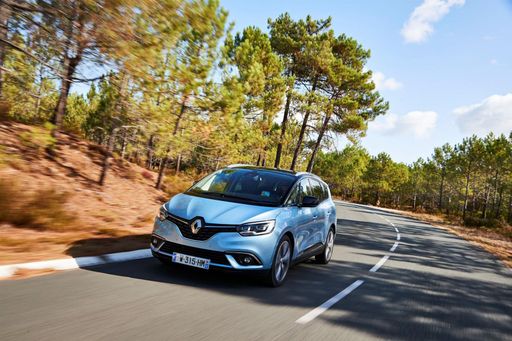
Renault Scénic
Costs and Consumption
View detailed analysis
Engine and Performance
View detailed analysis
Dimensions and Body
View detailed analysis
Peugeot 208
The Peugeot 208 feels like a city-savvy fox: compact, stylish and surprisingly grown-up, with a cabin that punches above its weight and enough personality to make daily commutes a little less boring. It’s a smart pick for buyers who want chic practicality without the showroom bluster — easy to park, thrifty to run and oddly fun when the road tightens up.
details



Renault Scénic
The Renault Scénic is a quietly clever family MPV that balances everyday practicality with unexpected flair, offering a roomy, flexible cabin that makes school runs and weekend escapes less of a chore. It won't dazzle like a sports car, but its composed ride, sensible tech and thoughtful storage solutions make it a superbly pragmatic choice for buyers who prefer substance with a wink.
details
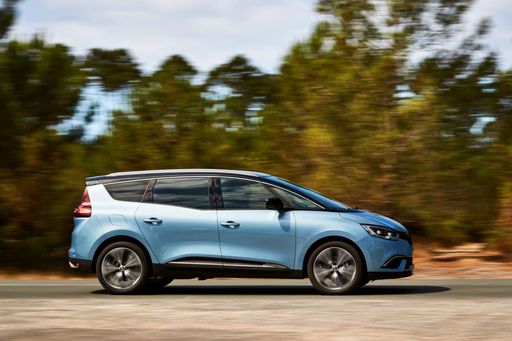
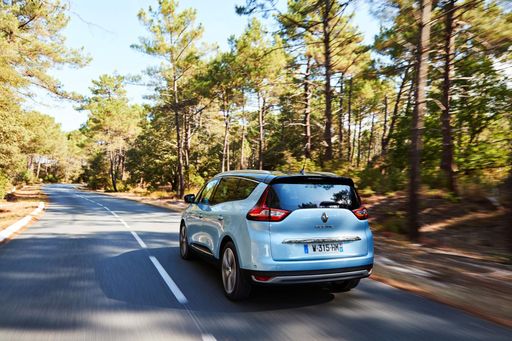
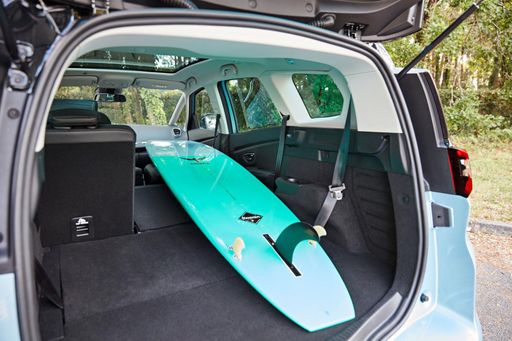
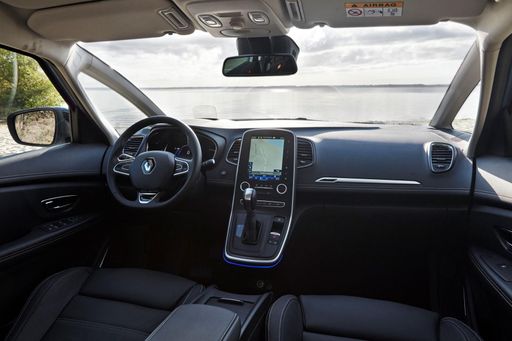
Costs and Consumption |
|
|---|---|
|
Price
20700 - 35200 £
|
Price
34600 - 44000 £
|
|
Consumption L/100km
4.5 - 5.2 L
|
Consumption L/100km
-
|
|
Consumption kWh/100km
14.1 - 15.4 kWh
|
Consumption kWh/100km
16.6 - 17.5 kWh
|
|
Electric Range
362 - 432 km
|
Electric Range
420 - 598 km
|
|
Battery Capacity
46 - 51 kWh
|
Battery Capacity
-
|
|
co2
0 - 117 g/km
|
co2
0 g/km
|
|
Fuel tank capacity
44 L
|
Fuel tank capacity
-
|
Dimensions and Body |
|
|---|---|
|
Body Type
Hatchback
|
Body Type
SUV
|
|
Seats
5
|
Seats
5
|
|
Doors
5
|
Doors
5
|
|
Curb weight
1165 - 1530 kg
|
Curb weight
1822 - 1927 kg
|
|
Trunk capacity
309 - 352 L
|
Trunk capacity
545 L
|
|
Length
4055 mm
|
Length
4470 mm
|
|
Width
1745 mm
|
Width
1864 mm
|
|
Height
1430 mm
|
Height
1571 mm
|
|
Max trunk capacity
1118 - 1163 L
|
Max trunk capacity
1670 L
|
|
Payload
380 - 430 kg
|
Payload
514 - 518 kg
|
Engine and Performance |
|
|---|---|
|
Engine Type
Petrol, Electric, Petrol MHEV
|
Engine Type
Electric
|
|
Transmission
Manuel, Automatic
|
Transmission
Automatic
|
|
Transmission Detail
Manual Gearbox, Reduction Gearbox, Dual-Clutch Automatic
|
Transmission Detail
Reduction Gearbox
|
|
Drive Type
Front-Wheel Drive
|
Drive Type
Front-Wheel Drive
|
|
Power HP
101 - 156 HP
|
Power HP
170 - 218 HP
|
|
Acceleration 0-100km/h
8.3 - 10.9 s
|
Acceleration 0-100km/h
7.9 - 8.6 s
|
|
Max Speed
150 - 200 km/h
|
Max Speed
150 - 170 km/h
|
|
Torque
205 - 270 Nm
|
Torque
280 - 300 Nm
|
|
Number of Cylinders
3
|
Number of Cylinders
-
|
|
Power kW
74 - 115 kW
|
Power kW
125 - 160 kW
|
|
Engine capacity
1199 cm3
|
Engine capacity
-
|
General |
|
|---|---|
|
Model Year
2023 - 2025
|
Model Year
2025
|
|
CO2 Efficiency Class
D, A, C
|
CO2 Efficiency Class
A
|
|
Brand
Peugeot
|
Brand
Renault
|
What drive types are available for the Peugeot 208?
The Peugeot 208 is offered with Front-Wheel Drive.




